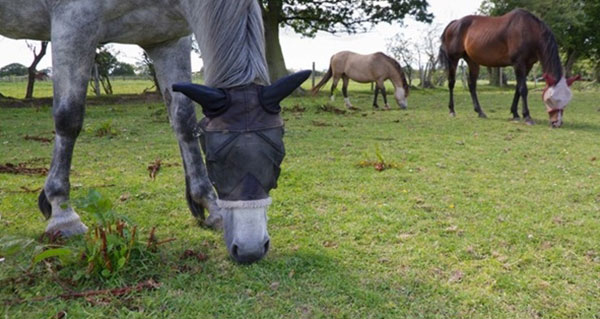Recent rain is going to lead to an eruption of insects, including biting midges, which can cause a lot of discomfort for our equine friends. There are a range of options for protecting them against insects
1/ Management: Insect activity tends to be higher in the early morning and late afternoon, so bringing your horse into a stable or yard at these times of day should reduce exposure to insects. It may be possible to place flyscreen material around stables for high risk horses (although small midges may still fit between the flyscreen holes).
Keeping horses in paddocks that are higher and further away from water, and keeping pasture short may reduce insect numbers in the direct vicinity of your horse.
Regular removal of faeces from paddocks will not only reduce the potential intestinal worm exposure for horses, it should also have an effect on fly numbers. Similarly consider the position of the property manure pile and keep it away from areas that horses frequent.
2/ Cover them up: There are a large variety of rugs, boots, and fly masks available for our equine friends. Rugs vary from light flag rugs, which are light and breathe well but may tear easily if your horse scratches on fences etc., through to rugs that are impregnated with fly repellent. The most important part of managing horses that are wearing rugs or other covers is to ensure that covers are removed on a regular basis (ideally daily) to allow visual checking for any underlying wounds or issues. It is also important to groom horses on a regular basis to maintain a healthy coat.
3/ Long acting fly repellents: Products such as ‘Shield’ or ‘Ytex Brute’, are designed to be poured or wiped on every 1-6 weeks to reduce nuisance flies and insects. (Please read the directions for application for each product).
4/ Short acting fly repellents: Products such as ‘Repel X’, ‘Musca ban’ or ‘Fly Repella Cream’ are designed as sprays or creams for short term control of flies and biting insects. They need to be applied frequently to maintain effectiveness. They are very useful for short exercises such going for a trail ride or lesson, or for a visit from the farrier or veterinarian.
5/ Antiseptic creams or sprays with fly repellents: Creams such as ‘Septicide’ or sprays such as ‘Cetrigen’ or ‘Chloromide’ have a combination of antiseptic and insect repellents for use on cuts and abrasions. We strongly recommend wounds that break the skin over joints, or deep wounds are checked by a veterinarian prior to applying these products to the wound, although they may be applied around the outside of the wound to provide relief from insects until the veterinarian arrives.


